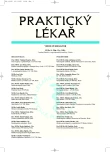Prescription of psychotropic drugs during pregnancy and breast-feeding in the general practitioner’s surgery.
Psychofarmaka v ordinaci praktického lékaře podávaná v těhotenství a v laktaci
Rozhodování o farmakoterapii duševních poruch v těhotenství a laktaci vychází z animálních studií, kazuistik, hlášení o nežádoucích účincích, registrů gravidních, anebo epidemiologických studií. V terapii zvažujeme na jedné straně následky, které může podání léků mít pro plod či kojence a na straně druhé negativní důsledky neléčené duševní poruchy pro ženu, anebo dítě. Alternativou farmakoterapie může být psychoterapie, anebo elektrokonvulzivní léčba. Mezi nejzávažnější následky podávání léků pro plod a kojence patří kongenitální malformace, neonatální toxicita, intoxikace a abstinenční symptomy a dlouhodobé neurobehaviorální následky. Vysazení dlouhodobé medikace znamená pro matku zvýšené riziko relapsu nebo zhoršení průběhu a celkového výsledného stavu onemocnění. V případě neléčené duševní poruchy jsou plod a dítě ohroženi především nedostatečnou péčí ze strany matky. Praktický lékař se ve své ordinaci často setkává s nemocnými s psychiatrickými diagnózami, běžně předepisuje psychofarmaka. Proto je důležitá základní orientace v problematice farmakoterapie duševních poruch v těhotenství a laktaci, znát možná rizika a alternativy. Přehled přináší informace o vztahu gravidity s psychózami, depresí, bipolární poruchou a úzkostnými poruchami. Detailně jsou diskutovány teratogenní a další negativní účinky jednotlivých skupin psychofarmak, antipsychotik, antidepresiv, stabilizátorů nálady, anxiolytik a hypnotik na plod a kojence v průběhu těhotenství a kojení. V přehledu jsou rovněž uvedeny základní principy farmakoterapie duševních poruch v těhotenství a laktaci.
Klíčová slova:
gravidita, laktace, duševní poruchy, psychofarmaka, kongenitální malformace
Authors:
P. Mohr
Authors‘ workplace:
Ředitel: prof. MUDr. Cyril Höschl, DrSc., FRCPsych
; 3. lékařská fakulta Universita Karlova v Praze
; Centrum neuropsychiatrických studií, Praha
; Psychiatrické centrum Praha
Published in:
Prakt. Lék. 2007; 87(1): 11-16
Category:
Reviews
Overview
The decision to prescribe drugs to treat patients with mental health problems is based on animal studies, case-reports, reports of adverse effects, registries of pregnant patients, or epidemiological studies. On the one hand, one must consider the consequences to the fetus or neonate of drug administration and, on the other hand, the negative impact of an untreated mental health disorder on the mother or child must be taken into account. Psychotherapy or electroconvulsive treatment are alternative options to pharmacotherapy. The most serious side-effects of drug treatment to the fetus and newborn include congenital malformations, intoxication and withdrawal syndromes and long-term neurobehavioral problems. Withdrawal of the maintenance medication can result in an increased risk of relapse, unfavorable course and overall outcome of the mother’s illness. With untreated illness, the fetus and child can be endangered through insufficient maternal care. The general practitioner frequently sees patients with mental health problems in his/her surgery, and commonly prescribes psychotropic drugs. Therefore it is essential to become familiar with the principles of drug treatment in pregnancy and breast-feeding, to know the risks and alternatives. This review summarizes data on the relationship between pregnancy and psychotic disorders, depression, bipolar disorder, and anxiety disorders. Teratogenesis is discussed in detail, as are other negative consequences of the various psychotropics, antipsychotics, antidepressants, mood stabilizers, anxiolytics, and hypnotics on the fetus and neonate during pregnancy and breast-feeding. Basic principles of drug treatment of mental disorders during pregnancy and breast-feeding are reviewed.
Key words:
pregnancy, breast-feeding, mental health problems, psychotropics, congenital malformations
Labels
General practitioner for children and adolescents General practitioner for adultsArticle was published in
General Practitioner

2007 Issue 1
- Advances in the Treatment of Myasthenia Gravis on the Horizon
- Memantine in Dementia Therapy – Current Findings and Possible Future Applications
- Memantine Eases Daily Life for Patients and Caregivers
- Possibilities of Using Metamizole in the Treatment of Acute Primary Headaches
- Hope Awakens with Early Diagnosis of Parkinson's Disease Based on Skin Odor
-
All articles in this issue
- Patent foramen ovale as a cause of paradoxical embolization in scuba divers. Screening possibilities, therapeutic and preventive recommendation.
- Hypoglycaemia-associated autonomic failure, its clinical assessment and treatment.
- Chronic renal failure in primary care
- Prescription of psychotropic drugs during pregnancy and breast-feeding in the general practitioner’s surgery.
- Wilson’s disease
- Diagnostics and treatment of rheumatoid arthritis – some new aspects
- Biochemical molecular mechanisms of heart failure (Part 2)
- Antimicrobial resistance in seven invasive bacterial species* monitored within EARSS in the Czech Republic (CR) from 2000 – 2006. (*Streptococcus pneumoniae, Staphylococcus aureus, Enterococcus faecalis, Enterococcus faecium, Escherichia coli, Klebsiella pneumoniae, Pseudomonas aeruginosa).
- Childhood injuries and their prevention
- Our experience with the treatment of acute mesenterial ischemia
- Craniopharyngioma in 79 years old man – a case study
- General Practitioner
- Journal archive
- Current issue
- About the journal
Most read in this issue
- Chronic renal failure in primary care
- Craniopharyngioma in 79 years old man – a case study
- Wilson’s disease
- Hypoglycaemia-associated autonomic failure, its clinical assessment and treatment.
